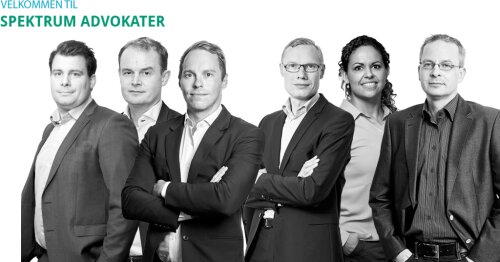Best ADR Mediation & Arbitration Lawyers in Herning
Share your needs with us, get contacted by law firms.
Free. Takes 2 min.
List of the best lawyers in Herning, Denmark
About ADR Mediation & Arbitration Law in Herning, Denmark
Alternative Dispute Resolution (ADR) methods such as mediation and arbitration are increasingly popular in Herning, Denmark, as efficient alternatives to conventional court proceedings. ADR offers parties a way to resolve conflicts privately, more rapidly, and often at lower costs. Mediation involves a neutral third party who assists the disputing parties in negotiating a mutually satisfactory agreement, while arbitration entrusts the resolution to an arbitrator or panel whose decision is typically binding. Danish ADR practices align with both national law and relevant EU directives, and Herning, being a key business hub in the Central Denmark Region, has a well-developed infrastructure to support such legal processes.
Why You May Need a Lawyer
Many individuals and businesses in Herning turn to ADR to handle disputes related to contracts, business-to-business transactions, employment matters, family law issues, construction projects, and tenancy disagreements. Legal assistance ensures that your interests are protected during mediation or arbitration and that any agreements reached are legally binding and enforceable. A lawyer can help evaluate your options, prepare documentation, select appropriate ADR methods, and represent you during the process. Legal guidance is especially important if the dispute involves significant financial sums, complex contracts, or risk of international jurisdictional issues.
Local Laws Overview
The ADR landscape in Herning follows broader Danish legislation and European Union standards. Key aspects include:
- Danish Arbitration Act: Sets the legal framework for arbitration, including the formation of arbitration agreements, selection of arbitrators, confidentiality, and enforcement of arbitral awards.
- Mediation Act: Provides for voluntary mediation in civil and commercial cases, officially recognizes mediated settlements, and ensures confidentiality of mediation proceedings.
- Court-Associated Mediation: Danish courts, including those serving Herning, may refer cases to mediation at any stage of proceedings.
- EU Directives: Denmark implements EU legislation concerning cross-border mediation and arbitration, particularly relevant in commercial disputes involving parties from different member states.
- Local Practice: Herning’s legal community works closely with Danish arbitration institutes and mediators, ensuring access to skilled professionals and updated procedures.
Frequently Asked Questions
What is the difference between mediation and arbitration?
Mediation is a voluntary process where a mediator helps parties negotiate a settlement. Arbitration is more formal, with an arbitrator making a binding decision on the dispute.
Is ADR mandatory before going to court in Herning?
ADR is not generally mandatory, but courts may encourage or refer parties to mediation. Some contracts may also require ADR before litigation.
Who can act as a mediator or arbitrator?
Qualified professionals, often with legal experience, serve as mediators and arbitrators. Parties may also agree to appoint a specialist in the relevant field.
Are arbitration awards legally binding in Denmark?
Yes, arbitral awards are binding and enforceable under Danish law, similar to a court judgment.
Is ADR confidential?
Both mediation and arbitration processes are confidential, protecting the privacy of the parties and the information shared.
Can I appeal an arbitration decision?
Arbitral awards are generally final and cannot be appealed except on specific legal grounds, such as procedural irregularities.
How long does the ADR process usually take?
Mediation often resolves disputes within weeks or a few months, while arbitration may take longer but is still typically faster than court litigation.
What types of disputes are suitable for ADR?
Most civil, commercial, and even some family law disputes can be addressed through ADR, provided all parties agree to participate.
How are fees for mediation or arbitration determined?
Fees depend on the complexity of the case, the mediator’s or arbitrator’s rates, and the duration of proceedings. Some institutes provide fixed pricing schedules.
Do I need a lawyer to participate in ADR?
While not required, having a lawyer ensures your rights are protected, especially in complex or high-stakes matters. Legal advice can help in preparing and reviewing agreements.
Additional Resources
If you need more information or wish to initiate ADR proceedings in Herning, the following resources may be helpful:
- Danish Institute of Arbitration (Voldgiftsinstituttet): Provides rules and administration for arbitration and mediation cases.
- The Danish Mediation Institute: Offers information on accredited mediators and mediation services.
- Herning City Court: Can refer parties to court-associated mediation and provides procedural guidance.
- Danish Ministry of Justice: Publishes information about current ADR legislation and reforms.
- Local Bar Association Offices: Assist with lawyer referrals and general legal support in ADR matters.
Next Steps
If you are facing a dispute or wish to explore alternatives to litigation in Herning, consider the following steps:
- Assess whether mediation or arbitration suits your case, especially if confidentiality and faster resolution are important.
- Consult with a qualified lawyer experienced in ADR to discuss your situation and possible strategies.
- Contact a recognized mediation or arbitration institute or inquire with your local court about referral programs.
- Prepare any necessary documentation, such as existing contracts or relevant correspondence, before entering ADR proceedings.
- Stay informed about your rights and obligations throughout the process to ensure the best outcome.
Seeking professional advice at an early stage can help you navigate the complexities of ADR and secure a fair resolution to your dispute.
Lawzana helps you find the best lawyers and law firms in Herning through a curated and pre-screened list of qualified legal professionals. Our platform offers rankings and detailed profiles of attorneys and law firms, allowing you to compare based on practice areas, including ADR Mediation & Arbitration , experience, and client feedback.
Each profile includes a description of the firm's areas of practice, client reviews, team members and partners, year of establishment, spoken languages, office locations, contact information, social media presence, and any published articles or resources. Most firms on our platform speak English and are experienced in both local and international legal matters.
Get a quote from top-rated law firms in Herning, Denmark — quickly, securely, and without unnecessary hassle.
Disclaimer:
The information provided on this page is for general informational purposes only and does not constitute legal advice. While we strive to ensure the accuracy and relevance of the content, legal information may change over time, and interpretations of the law can vary. You should always consult with a qualified legal professional for advice specific to your situation.
We disclaim all liability for actions taken or not taken based on the content of this page. If you believe any information is incorrect or outdated, please contact us, and we will review and update it where appropriate.











